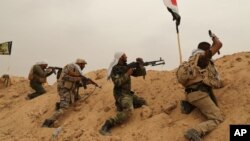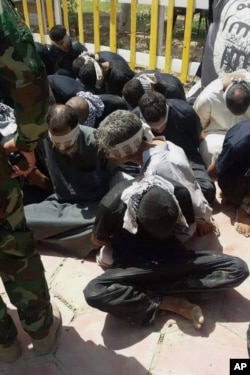After a rare victory this week, Iraqi soldiers greeted the media, displaying weapons and 24 blindfolded young men they said were captured fighters for the so-called Islamic State.
"Thank God we have arrested these members of ISIS. We will get them wherever they run. We will chase them out with God's help,” one soldier said, patting a detainee on the back for emphasis.
The United States pledged this week to send 450 more troops to advise Iraqi forces against the Islamic State but some observers say Washington is in a quandary: by arming its allies, it may also continue to arm its enemies. For the U.S.-led coalition to win, they say, not just more force is needed, but a smarter fight.
“The policy at the moment is to do as little as possible to make it appear that we are actually doing something,” said Max Boot, a senior fellow at the Council on Foreign Relations, “without actually doing enough to achieve our objectives as laid out by President Obama, which is to 'degrade and to destroy' the Islamic State.”
Airstrikes have killed 10,000 Islamic State fighters since the air campaign began last year, according to U.S. officials, but the group continues to grow. By some estimates the jihadist group now controls one-third of Iraq and half of Syria.
Boot said that when President Obama took office, he promised the American public a withdrawal from Middle East wars. Now the administration lacks the political will to beat the Islamic State which Boot said would require sending American military trainers into battles with Iraqi soldiers.
Escalating the fight could also backfire without a larger commitment than the U.S. government has shown, Boot said.
Captured weaponry
In recent years, the Islamic State has gathered U.S. weapons from Iraqi soldiers fleeing battles and through so-called moderate rebels armed by the U.S. in Syria. A renewed American commitment to fighting Islamic State, said Boot, would also mean re-arming some Iraqi soldiers. If those soldiers fled or were captured or killed, the weapons would likely be added to the Islamic State’s arsenal.
“We can either stop sending weapons,” explained Boot, “or we could do a better job of training the Iraqis so they could fight more effectively and not run away when confronted by an Islamic State attack."
“I would argue for the latter option,” he added.
Military operations in Iraq need to be more forceful, according to Andreas Krieg of King’s College London. In addition, they need to be better planned, he said.
The coalition should focus on training Sunni soldiers to fight the Islamic State, Krieg said, rather than relying on Shi'ite forces that complicate the battle because of sectarian divides. And beyond better training, those Sunni fighters need to be better motivated, he added.
Sunni tribes
For example, Sunni tribal fighters in Anbar province, where the Islamic State holds towns and cities, cannot be counted on to serve the interests of the Baghdad government, led by Shi'ite Prime Minister Haider al-Abadi.
“This is a socio-political issue,” Krieg said. “Basically the Abadi government in Baghdad needs to make a solid and tangible promise to these tribes in Anbar province that they will get more autonomy in the future.” He added, “They’re fighting for their own autonomy and not fighting for the government in Baghdad that they hate so much.”
The longer the coalition fails to beat the Islamic State, Krieg said, the stronger the group becomes. A year ago, when Islamic State shocked the world with its rapid land grabs, the group did not have the capacity to use all its weapons. Now, its fighters have had a year to train and develop skills, and the coalition remains locked in a “vicious circle.”
“We are in a dilemma now,” Krieg said. “We cannot continue the way we are continuing now.”


